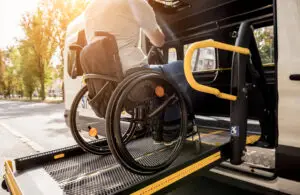
It is rare to receive a driving under the influence (DUI) charge in California. Regardless, if you are intoxicated and operating a wheelchair, you can put others in danger. Thus, in this scenario, you can receive a DUI charge.
If you are charged with a DUI in a wheelchair in Los Angeles, legal help is available. At this point, you can connect with a Los Angeles DUI attorney. Next, your lawyer can review your DUI case and help you figure out the best way to contest your DUI in a wheelchair charge.
How a Wheelchair Is Classified in California
In California, a wheelchair is considered to be a piece of durable medical equipment. The term describes both manual wheelchairs and power mobility devices like power wheelchairs. Meanwhile, a wheelchair may be medically necessary for someone dealing with a disability or mobility restrictions.
There can be instances in which someone that needs a wheelchair is arrested for driving under the influence in California. In these instances, the wheelchair operator has a blood alcohol concentration (BAC) that surpasses the legal limit. Since the operator is intoxicated and puts themselves and others at risk, they are charged accordingly.
In addition, there can be times when someone operates a wheelchair while intoxicated, despite the fact that the equipment is not medically necessary. A police officer can arrest this individual for driving under the influence. This individual can receive jail time, a fine, and other penalties for their actions.
What to Do if You Are Charged with a DUI in a Wheelchair in California
Do not expect your DUI in a wheelchair charge to go away on its own. Your charge can lead to a conviction that will show up on your criminal record in the years to come. Fortunately, you can hire a DUI lawyer in Los Angeles to help you avoid this outcome.
A Los Angeles DUI lawyer will examine all of the facts of your driving under the influence in a wheelchair charge. Then, the attorney can develop a legal strategy to help you get your DUI charge dismissed or reduced. Common strategies for a DUI in a wheelchair case include:
“No Driving” Defense
You may be sitting in a wheelchair while inebriated but not operating it. Or, you may be standing near a wheelchair at the time a police officer arrests you for a DUI. In either of these scenarios, you may be able to use a “no driving” defense to dispute your DUI charge.
With a no-driving defense, you attempt to show the court that you were not operating a wheelchair at the time you were arrested for driving under the influence. You may be able to provide an abundance of evidence to support your argument. If you succeed, the court may have no choice but to rule in your favor.
A DUI attorney in Los Angeles may encourage you to utilize a no-driving defense if there is no proof that you were actually operating a wheelchair when you were arrested for a DUI. If you move forward with this strategy, your attorney will ensure that you can present a compelling argument to dispute any claims from the prosecutor in your case. However, if you previously admitted that you were operating a wheelchair while intoxicated, you may have to consider other legal strategies.
Miranda Rights
If a police officer arrests you for a DUI, they must read your Miranda rights. During your arrest, the officer will share a Miranda warning. They will also confirm that you understand the warning and all that it entails.
Sometimes, an individual does not receive a Miranda warning during a DUI arrest. Comparatively, if an individual is intoxicated when they receive their Miranda warning, they may be unaware of what the warning means. If you are arrested for a DUI in one of these situations, you may be able to argue that you were not properly informed about your Miranda rights.
If your Miranda rights were violated, notify your attorney. Remember, your attorney is responsible for protecting your legal rights. Therefore, your attorney may be able to use the fact that your Miranda rights were violated to help you achieve optimal results in your DUI case.
Probable Cause
To be arrested for a DUI in a wheelchair, a police officer must have probable cause. This requires the officer to show that they have a reasonable suspicion that you were operating a wheelchair while inebriated. The officer must evaluate your sobriety to determine if a field sobriety test or another BAC assessment is warranted, too.
By speaking with a DUI attorney, you can investigate whether a police officer had probable cause to arrest you. Your attorney will get a copy of your police report and other information to learn about your arrest. If any information is missing, your lawyer may be able to argue that a police officer did not have probable cause.
If a police officer lacks probable cause, your attorney may be able to get certain pieces of evidence in your case suppressed. This can hurt the prosecutor’s argument against you. It may lead a judge to dismiss your case.
When to Consider a Plea Bargain Following a DUI in a Wheelchair Arrest
If you have concerns about whether your DUI in a wheelchair charge will be cleared, you may want to consider a plea agreement. With a plea bargain, you accept a charge with fewer penalties than the one you initially faced. This allows you to settle your DUI charge in less time than what would be required if you went to trial.
Your lawyer can teach you about plea bargains and help you weigh the pros and cons of proposing one. If your attorney feels a plea agreement can be beneficial, they can explain why. Your lawyer can answer any questions you have regarding plea agreements so you can make an informed decision about whether to propose one.
When you present a plea agreement, it is crucial to account for the prosecutor. If it does, your agreement is likely to be approved. This allows you to accept some penalties for your DUI charge and move forward from your case as quickly as possible.
Reach Out to a Los Angeles DUI Lawyer
An LA DUI lawyer can help you with a charge of driving under the influence in a wheelchair in California. For more information, please get in touch with an LA DUI attorney.






